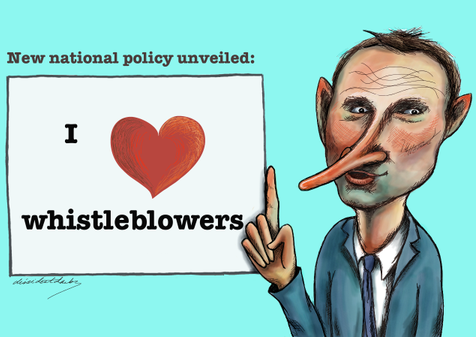What For?
The goal of Whistleblowers Australia (WBA) is to
help promote a society in which it is possible to speak out without
reprisal about corruption, dangers to the public and environment, and
other vital social issues, and to help those who speak out in this way
to help themselves.
The group is for those who have exposed corruption or any form of
malpractice, especially if they were then hindered or abused, and for
those who are thinking of exposing it or who wish to support those who
are doing so. A person is a whistleblower by her/his actions and
does not need to be registered or identified with any organisation.
WBA uses two main approaches: to encourage self-help and mutual help among
whistleblowers, and to support campaigns on specific
issues.
Self-help and mutual help
The best ways for whistleblowers to succeed is to develop their own skills and understanding
and to exchange insights with others in similar situations. WBA
facilitates self-help by providing information to
whistleblowers and by publishing a newsletter. The organisation
facilitates mutual help by holding meetings of whistleblowers and
supporters, and by providing contacts with like-minded individuals and
groups.
The organisation
WBA began as Whistleblowers Anonymous in 1991, and
was incorporated in its present form in 1993. (See our History page for
more information.) Membership is open to anyone who supports the goals
of the organisation. Members include charity workers, church employees,
corporate employees, doctors, police, public servants, researchers,
teachers and concerned citizens in general.
WBA's national committee offers information, handles
memberships, produces a newsletter and helps promote campaigns.
Since it was set up, WBA has
promoted whistleblower legislation,
called for royal commissions into corruption and generally given
whistleblowing a much higher profile. Just as important is its quiet
work in supporting individual whistleblowers. It provides enormous
benefits from shared expertise, moral support, access to research, and
links to relevant networks.
There are limits to what WBA can
do. It does not normally act as an advocate for individual
whistleblowers. It has only minimal funds obtained from memberships.
All committee members act on a voluntary basis. Unfortunately, WBA does
not have the resources to campaign on any individual's behalf. What WBA
can do is provide information, advice and contacts so that whistleblowers and
their supporters can become more effective in achieving their own goals.
Reform agenda
WBA supports initiatives and ongoing efforts to
create a culture where people can speak out without reprisal.
- Free speech for employees and
others. Repressive legislation and bureaucracies inhibit many
workers from making disclosures. Comprehensive legislative reform is
needed to enshrine the right of private- and public-sector employees
and others to speak out on matters of social importance in the wider
public interest.
- Immunity from prosecution for
journalists. Current legislation places a journalist at risk of
prosecution for contempt for refusing to reveal a whistleblower's
identity in court proceedings. Comprehensive legislative reform is
needed to enshrine the right of a journalist to put the public's right
to know ahead of any government or other interest without fear of
prosecution in the absence of any national security risk.
- Challenging defamation
restraints. Australia's defamation laws are mainly helpful to
the rich and powerful and frequently operate to prevent the exposure of
harmful, possibly corrupt behaviour by way of confidential settlements
that deny the public its right to know. Legislation needs to be
reformed to limit satisfaction to a full public correction of the
alleged defamatory statements prominently displayed in the news media,
together with a full disclosure of the grounds of settlement.
Defamation suits should not be permitted to remain a litigation
opportunity.
- Whistleblowing legislation. Whistleblowers can be protected by laws against reprisals. There are whistleblowing acts in every state and territory, with no
conformity between them. All have severe flaws and have been criticised
by whistleblower-supporting organisations. One problem is that they
don't actually provide protection against attacks in the first
place.
|
